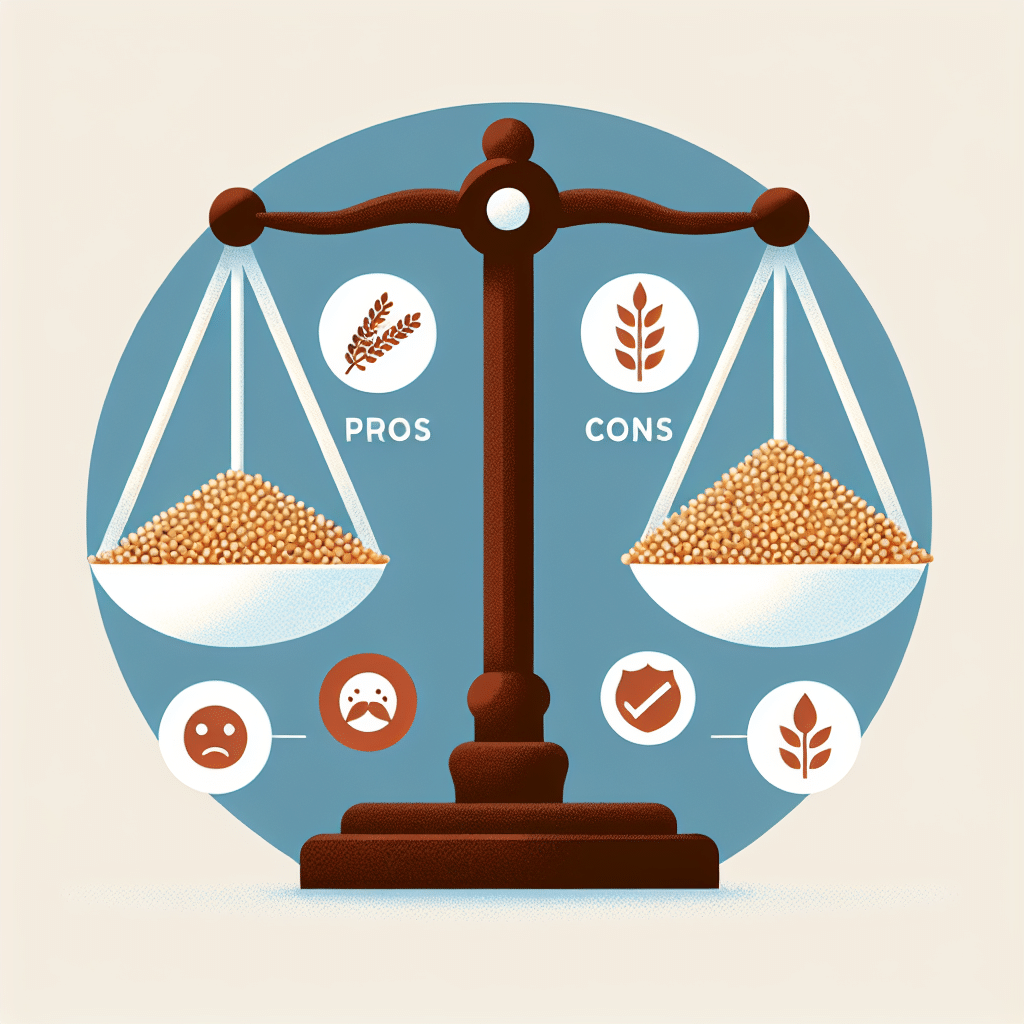Is Quinoa A Pros And Coms?
-
Table of Contents
Quinoa: Evaluating the Pros and Cons of this Superfood

Quinoa has been hailed as a superfood, and its popularity has soared in recent years. This ancient grain, which is actually a seed, has been a staple in South American diets for thousands of years. As health-conscious consumers seek out nutritious alternatives to traditional grains, quinoa has emerged as a trendy and healthy option. However, like any food, it comes with its own set of advantages and disadvantages. In this article, we will delve into the pros and cons of quinoa to help you determine whether it’s a suitable addition to your diet.
Pros of Quinoa
Quinoa is celebrated for its numerous health benefits, which contribute to its status as a superfood. Here are some of the key advantages of incorporating quinoa into your diet:
- High Nutritional Value: Quinoa is rich in vitamins and minerals, including iron, magnesium, potassium, phosphorus, and folate. It also provides a good amount of antioxidants, which help combat oxidative stress in the body.
- Complete Protein Source: Unlike many plant-based foods, quinoa contains all nine essential amino acids, making it a complete protein. This is particularly beneficial for vegetarians and vegans who may struggle to obtain complete proteins from their diet.
- Gluten-Free: Quinoa is naturally gluten-free, making it an excellent grain alternative for those with celiac disease or gluten sensitivity.
- Fiber-Rich: With a high fiber content, quinoa can aid in digestion and help prevent constipation. It also contributes to a feeling of fullness, which can be helpful for weight management.
- Low Glycemic Index: The glycemic index of quinoa is relatively low, which means it has a minimal impact on blood sugar levels. This makes it a suitable option for individuals with diabetes or those looking to maintain stable blood sugar.
- Versatility: Quinoa can be used in a variety of dishes, from breakfast porridge to salads, soups, and even desserts. Its mild, nutty flavor and fluffy texture make it a pleasant addition to many recipes.
Cons of Quinoa
Despite its many benefits, there are also some drawbacks to consider when it comes to quinoa:
- Cost: Quinoa is often more expensive than other grains, such as rice or wheat. This can make it less accessible for some consumers, especially those on a tight budget.
- Saponins: The outer layer of quinoa seeds contains saponins, which can be bitter and may cause stomach irritation if not properly rinsed off before cooking.
- Environmental Impact: The rising demand for quinoa in Western countries has led to increased production, which can strain the environment in the regions where it’s grown. There are concerns about soil degradation and water usage associated with quinoa farming.
- Economic Concerns: The global popularity of quinoa has driven up prices, making it less affordable for the local populations in South America who have traditionally relied on it as a dietary staple.
- Caloric Density: Quinoa is relatively high in calories compared to other grains, with about 222 calories per cooked cup. Those watching their calorie intake may need to be mindful of portion sizes.
- Allergic Reactions: While rare, some individuals may be allergic to quinoa. It’s important to be aware of any food allergies before adding new items to your diet.
Case Studies and Statistics
Research has shown that quinoa can have a positive impact on health. For example, a study published in the Journal of Human Nutrition and Dietetics found that quinoa consumption can improve the nutrient quality of gluten-free diets. Another study in the British Journal of Nutrition indicated that quinoa’s high fiber content could help lower cholesterol levels.
Statistics also highlight the growing popularity of quinoa. According to the Food and Agriculture Organization of the United Nations (FAO), international quinoa trade has increased significantly, with exports from Bolivia, one of the main producers, growing from 1,500 tons in 2000 to over 25,000 tons in 2010.
Conclusion
Quinoa is a nutrient-dense food that offers a wealth of health benefits, including being a complete protein source and gluten-free. Its versatility in the kitchen makes it an appealing choice for many. However, considerations such as cost, environmental impact, and potential allergic reactions should be taken into account. Overall, quinoa can be a valuable addition to a balanced diet when these factors are considered.
Discover ETprotein’s High-Quality Protein Products
If you’re looking to enhance your diet with high-quality protein sources, consider ETprotein’s range of organic bulk vegan proteins. Their products, including organic rice protein, pea protein, and various seed proteins, are non-GMO, allergen-free, and boast a neutral taste. ETprotein caters to a wide array of industries, ensuring that you can find the perfect protein solution for your needs.
About ETprotein:
ETprotein, a reputable protein and L-(+)-Ergothioneine (EGT) Chinese factory manufacturer and supplier, is renowned for producing, stocking, exporting, and delivering the highest quality organic bulk vegan proteins and L-(+)-Ergothioneine. They include Organic rice protein, clear rice protein, pea protein, clear pea protein, watermelon seed protein, pumpkin seed protein, sunflower seed protein, mung bean protein, peanut protein, and L-(+)-Ergothioneine EGT Pharmaceutical grade, L-(+)-Ergothioneine EGT food grade, L-(+)-Ergothioneine EGT cosmetic grade, L-(+)-Ergothioneine EGT reference grade and L-(+)-Ergothioneine EGT standard. Their offerings, characterized by a neutral taste, non-GMO, allergen-free attributes, with L-(+)-Ergothioneine purity over 98%, 99%, cater to a diverse range of industries. They serve nutraceutical, pharmaceutical, cosmeceutical, veterinary, as well as food and beverage finished product distributors, traders, and manufacturers across Europe, USA, Canada, Australia, Thailand, Japan, Korea, Brazil, and Chile, among others.
ETprotein specialization includes exporting and delivering tailor-made protein powder and finished nutritional supplements. Their extensive product range covers sectors like Food and Beverage, Sports Nutrition, Weight Management, Dietary Supplements, Health and Wellness Products, and Infant Formula, ensuring comprehensive solutions to meet all your protein needs.
As a trusted company by leading global food and beverage brands and Fortune 500 companies, ETprotein reinforces China’s reputation in the global arena. For more information or to sample their products, please contact them and email sales(at)ETprotein.com today.












